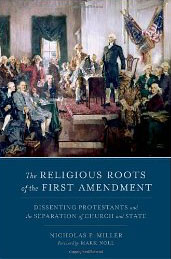The Religious Roots of the First Amendment: Dissenting Protestants and the Separation of Church and State

The Religious Roots of the First Amendment:
Dissenting Protestants and the Separation of Church and State
Nicholas P. Miller
Oxford University Press 2012
Description
Traditional understandings of the genesis of the separation of church and state rest on assumptions about “Enlightenment” and the republican ethos of citizenship. In The Religious Roots of the First Amendment, Nicholas P. Miller does not seek to dislodge that interpretation but to augment and enrich it by recovering its cultural and discursive religious contexts–specifically the discourse of Protestant dissent. He argues that commitments by certain dissenting Protestants to the right of private judgment in matters of Biblical interpretation, an outgrowth of the doctrine of the priesthood of all believers, helped promote religious disestablishment in the early modern West.
This movement climaxed in the disestablishment of religion in the early American colonies and nation. Miller identifies a continuous strand of this religious thought from the Protestant Reformation, across Europe, through the English Reformation, Civil War, and Restoration, into the American colonies. He examines seven key thinkers who played a major role in the development of this religious trajectory as it came to fruition in American political and legal history: William Penn, John Locke, Elisha Williams, Isaac Backus, William Livingston, John Witherspoon, and James Madison.
Miller shows that the separation of church and state can be read, most persuasively, as the triumph of a particular strand of Protestant nonconformity-that which stretched back to the Puritan separatist and the Restoration sects, rather than to those, like Presbyterians, who sought to replace the “wrong” church establishment with their own, “right” one. The Religious Roots of the First Amendment contributes powerfully to the current trend among some historians to rescue the eighteenth-century clergymen and religious controversialists from the enormous condescension of posterity.
Features
Shows how the separation of church and state was a fundamentally religious idea, originated, promoted and established by Biblically-conservative Christians based on primarily Biblical and religious ideas.
Also suggests that John Locke and other thinkers and ideas often associated with Enlightenment thought were actually influenced by and in some cases the product of Protestant religious thought.
Reviews
“Professor Miller’s sweeping study makes a compelling case for restoring theology to a prominent place in the complex web of social, political, and intellectual factors contributing to American church-state thinking. Too often, modern scholarship has assumed that the rights of conscience sprung primarily from the Enlightenment, and Professor Miller’s impressively clear analysis reminds us that we must take theology seriously if we seek to take the historical actors themselves seriously.”–Donald Drakeman, author of Church, State, and Original Intent
“Nicholas Miller carefully and persuasively demonstrates that many of the most ardent and effective American advocates of the disestablishment of religion were people of faith. These Americans argued that government does faith no favors when it seeks to use civil power to advance religion, and that all people must have the liberty to choose or reject God, or faith commitments are meaningless. Miller is exactly right to suggest that it is long past time for us to give the religious case for church-state separation and religious liberty its due.”–Melissa Rogers, Director, Center for Religion and Public Affairs at Wake Forest University Divinity School
“Nicholas P. Miller’s splendid survey of the distinctly Protestant concept of the right of private judgment makes a major contribution to the debate over the religious origins of the First Amendment. The author traces the idea of the sacred freedom of an individual’s conscience through an array of pivotal thinkers and offers compelling evidence that the concept contributed to the understanding of James Madison, a leading framer of the separation clause of the Constitution.”–James E. Bradley, Geoffrey W. Bromiley Professor of Church History, Fuller Seminary
“The Religious Roots of the First Amendment provides a needed counterbalance to the emphasis on the secular origins of American religious liberty. The author promises to take religion seriously and he fulfills his promise. Especially important is his restoration of William Penn to central importance in the emergence of American religious liberty.”–Thomas J. Curry, author of Farewell to Christendom: The Future of Church and State in America
About the Author
Nicholas P. Miller is Director of the Andrews University International Religious Liberty Institute and Associate Professor of Church History at Andrews University Seminary.